  次Googleボタンでかちりと鳴ることによって日本語のこのページを見なさい 次Googleボタンでかちりと鳴ることによって日本語のこのページを見なさい
|

|
|
Canford Village
|
All of
these pictures are of a row of cottages in the tiny hamlet of Canford in Dorset.
The cottages were built for farm workers
on the local estate, which covered a large part of this area. This
estate belonged to Lord and Lady Wimborne, who lived in nearby
Canford House. The house is now a private school.
I
took these pictures of Canford Village because I thought the cottages
and gardens looked charming on the morning I was there. The village is
tiny, consisting solely of this one street of cottages and a few other
houses.
The
full name of the village is Canford Magna. It is situated just to the
south-east of the small town of Wimborne in Dorset. Wimborne has an
ancient Minster church and an interesting Museum in the town centre. For
those who like seeing modern crafts for sale there is a Crafts Centre
with tearooms on the edge of the town. All of these are worth a visit.
|
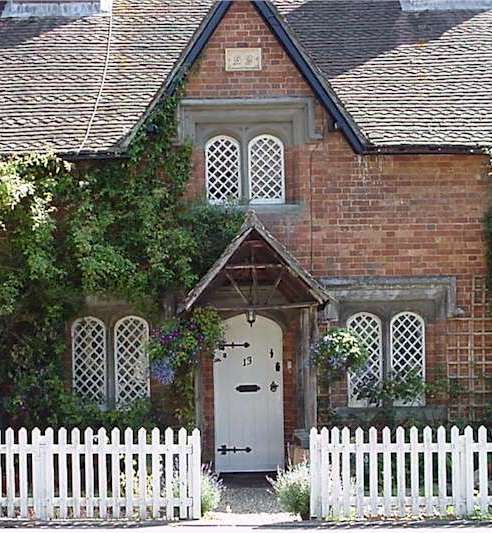 |
|
What a
charming cottage. The hanging baskets are very pretty. If you look
carefully you can see that the occupants have planted lavender on either
side of the entrance so that you brush against the plants and release
their aroma as you enter the garden. Such a nice idea.
We
call these windows 'leaded'. Originally each window consisted of many small
pieces of glass held together with strips of lead. In the past it was
difficult to make large panes of glass so windows were constructed in
this manner. Nowadays you can still see windows like these in older houses or
houses that imitate traditional styles of building. They look lovely but
probably make the rooms quite dark.
The
house number is thirteen. In Britain this is considered an unlucky
number and some superstitious people would not consider living in a
house with this number. In some blocks of flats and hotels the number is
not used at all. Obviously the people who live here are not bothered by
this and must indeed feel lucky to live in such an attractive home. In
fact lavender is considered a lucky plant, so perhaps that is why they
have planted it here.
|
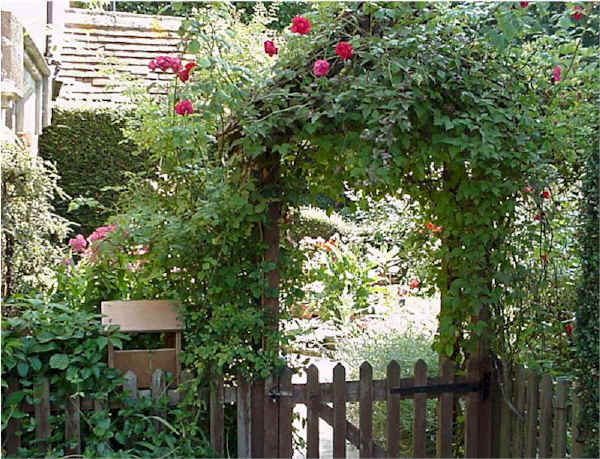 |
|
This little gate with
it's charming arch of roses leads into the garden of the last house in the
row. The owner of the garden has cleverly trained a beautifully scented
climbing rose over the arch. If you look closely you can also just see
the flowers of a honeysuckle peeping out from the sides of the arch. The
combination of these two scents was just heavenly.
If you are wondering
what the little box to the left of the gate is, well, so am I! It's not
a bird nesting box so it must be there for newspapers or bottles of
milk. It was empty when I visited, so it will have to remain a mystery.
In Britain you
can have bottles of milk delivered to your door every morning by your
local milkman. At the end of each week the milkman calls for payment. Everybody used to have milk delivered
in this way, but nowadays many
people just buy their milk from the supermarket with their other
shopping and this service is slowly dying out.
|
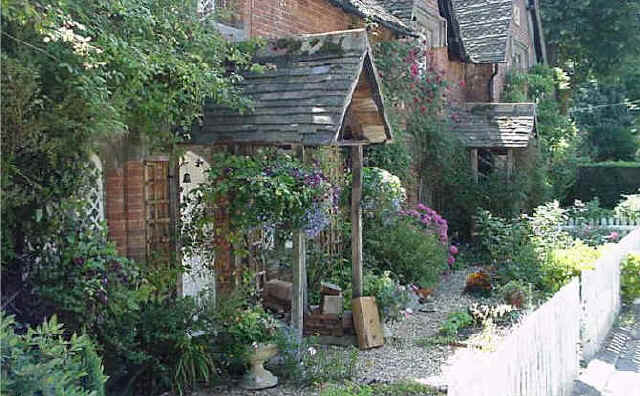 |
|
It was
a lovely sunny summer morning when I took these photos and the gardens
looked at their best. The weather can be very uncertain in Britain.
Sometimes the summer is dry and hot but more often there are spells of
rain and cool weather. This can be unpleasant if the weather is wet
during your summer holidays, but all the rain does benefit the plants.
After a period of rain the countryside is wonderfully green and lush.
|
|
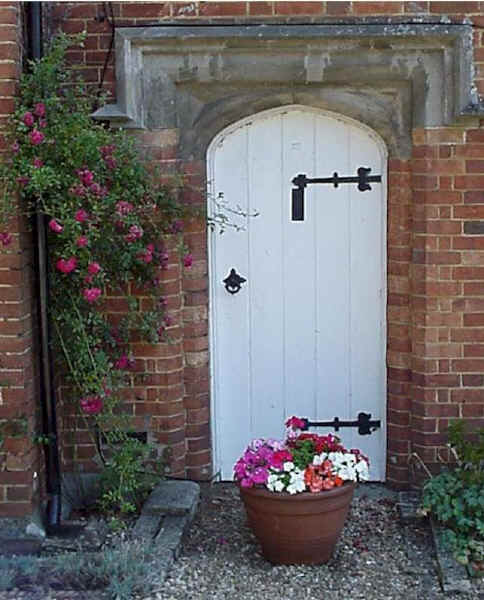
|
|
I think that this cottage must have more than one door as
it would not be very convenient to have to jump over this plant pot every time you wanted
to enter the house!
The
combination of weathered old bricks, white paint and the flowers looks wonderful
together. The colour of the climbing roses match the busy lizzies in the pot perfectly. I always plant some busy lizzies myself
each summer as they grow well in shady corners of the garden and flower
right through the summer, until the first frosts kill them, often as
late as November.
|
|
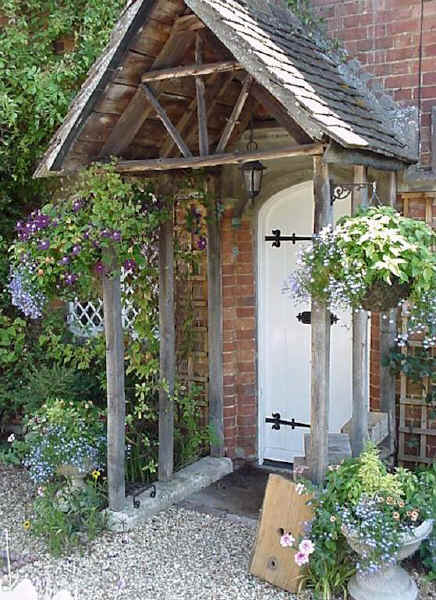
|
|
Here
is a close-up of the front door of number
thirteen. The owners seem to be in the middle of doing some sort of repair
job, with the bits of wood and bricks that have been left on the porch,
but I can't see what needs fixing. Perhaps they have gathered these bits
and pieces together to make some improvements in the back garden.
The
mixture of blues, pinks and purples of the flowers in the pots is a very
pretty combination, especially set against the pale gravel of the path.
Gravel was a very popular choice for garden paths in Victorian times and
is currently enjoying a revival in popularity, as people like the
traditional look it creates.
|
|
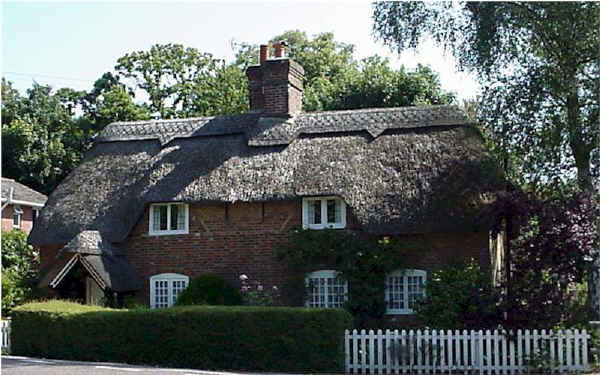 |
|
Just down the road from the cottages we have just seen is this lovely example
of a traditional thatched cottage. Many British people dream of living
in such a pretty cottage with roses climbing the walls. If you visit our
Crafts section you can make your own, but unfortunately only as a
needlework tea cosy. The real ones are much more difficult to acquire!
|
| hamlet |
Hamlet
is the word used to describe a very small village. Here it is
little more than a collection of houses along a road.
|
|
| not
bothered |
A
casual, slang expression. Here it means that the owners are not
concerned about superstition.
It
can also be used to show a lack of interest in doing something. As
in-
'Shall
we go to the cinema tonight?' ' I am not bothered, I would rather
stay at home.'
|
|
| heavenly |
This
can refer to things connected to heaven or God. Here it has a
wider meaning; when you have a very pleasant experience it makes
you feel that you are in a perfect state 'like being in heaven'. |
|
| dying
out |
If
something, such as a skill or tradition, is gradually ceasing you
say that it is dying out. |
|
| weathered |
When
winds, rain and extremes of temperature have aged a building you
say that is weathered. You can also use it about people but be
careful to whom you say it!
'The
old fisherman had a face weathered by years at sea'
|
|
| spells |
In
this case it means a short period of this type of weather.
You
'spell' a word by naming all the letters of the word in the
correct order.
If
you are a magician you 'cast a spell' over someone by saying some
magic words which turns that person into a frog (or whatever you
want!).
|
|
| thatched
cottage |
The
word cottage is generally used to mean a charming old country
house that would probably have originally have been occupied by
farm workers. The roof is 'thatched' when it is made of straw or
reeds. It is a skilled craft to be able to construct these roofs. |
|
|
|

|
に、英国の休日英語、英国のレッスンは田舎、英国の庭、英国の庭、英国の国の庭、庭の英語、庭の設計、庭、コテッジ庭いじりをする、小さい庭、英国の景色、英国のばら、英国のばら、庭のばら、ばら、上昇のばら、ピーターのbeale、バラの茂み、ピンクのばら、イギリスの田舎旅行する
|

|
|
